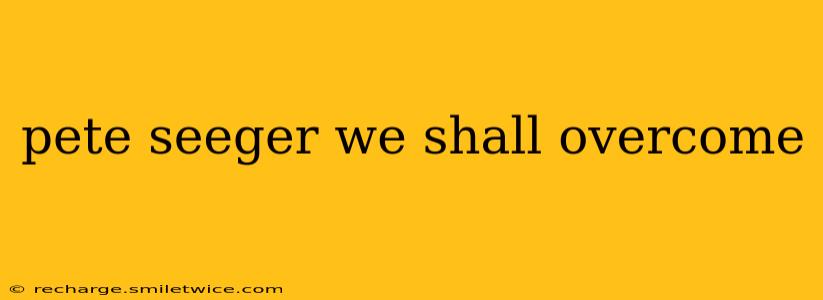Pete Seeger's enduring association with the iconic anthem "We Shall Overcome" is a powerful testament to the song's role in the American Civil Rights Movement and its continuing relevance today. Far from simply performing the song, Seeger played a pivotal role in its popularization, transforming a relatively obscure gospel hymn into a global symbol of hope and perseverance in the face of adversity. This exploration delves into Seeger's contribution, the song's history, and its lasting impact.
What is the history of the song "We Shall Overcome"?
The origins of "We Shall Overcome" trace back to a 19th-century spiritual. While the exact origins are debated, the melody is rooted in various gospel traditions. However, its modern transformation began within the Civil Rights Movement. During the early 1940s, activists in the South, particularly within the Highlander Folk School, began using a variation of the song, singing "We Will Overcome." This version emphasized a sense of collective action and determination against racial segregation.
How did Pete Seeger popularize "We Shall Overcome"?
Pete Seeger, a prominent folk singer and activist deeply involved in the Civil Rights Movement, played a crucial role in disseminating "We Will Overcome." He encountered the song during his travels and activism and recognized its potent potential as a rallying cry. Seeger altered the lyrics slightly, changing "We Will Overcome" to "We Shall Overcome," adding a sense of prophecy and inevitability to the message. His performances at rallies and protests, alongside his involvement in recording the song, brought it to a much wider audience. His influence helped transform a relatively unknown spiritual into an iconic anthem.
What role did "We Shall Overcome" play in the Civil Rights Movement?
"We Shall Overcome" became the anthem of the Civil Rights Movement. Its simple yet powerful message of perseverance resonated deeply with participants and supporters. The song provided a sense of unity and collective strength during marches, sit-ins, and other forms of protest. Its use at pivotal moments, like the 1963 March on Washington, further solidified its status as a symbol of the movement's aspirations and struggles. Its lyrics offered solace, encouragement, and a tangible expression of the fight for racial equality.
How did Pete Seeger's involvement differ from other artists who performed the song?
While many artists performed "We Shall Overcome," Seeger's involvement transcended mere performance. He actively promoted the song, believing in its power as a tool for social change. His advocacy went beyond musical performance; it was a conscious act of activism, utilizing the song's inherent power to unify and inspire. He understood the song's potential to transcend the immediate context of the Civil Rights Movement and become a rallying cry for social justice movements worldwide. His deep commitment to social justice informed his approach to sharing the song and shaped its trajectory.
What is the lasting impact of "We Shall Overcome"?
The lasting impact of "We Shall Overcome" is undeniable. It remains a potent symbol of hope and resilience, used in various social justice movements beyond the Civil Rights Movement. Its message of overcoming adversity continues to resonate with activists and individuals fighting for equality, justice, and human rights across the globe. The song transcends its historical context, offering a timeless message of hope and the power of collective action in the pursuit of a better world. Its enduring popularity speaks to its profound impact on social and political consciousness. Seeger’s contribution, therefore, extends far beyond a single musical performance; it represents a legacy of using music as a powerful catalyst for change.
